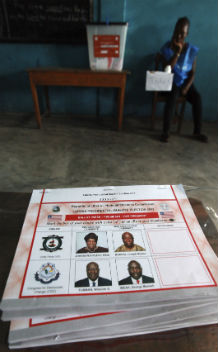Liberia: Muddy Waters
November 10, 2011 12:06 pm (EST)
- Post
- Blog posts represent the views of CFR fellows and staff and not those of CFR, which takes no institutional positions.
More on:

Ellen Johnson-Sirleaf coasted to victory in the November 8 presidential runoff election because the opposition candidate, Winston Tubman, boycotted the vote claiming fraud. Turnout was low, especially in comparison with the 72 percent turnout in the first round. The blessing is that unlike a few days ago, there was less violence than many had feared. The runoff was praised by the Carter Center and by the Economic Community of West African States (ECOWAS) election observers, though Attahiru Jega, its spokesman and the chairman of Nigeria’s Independent National Electoral Commission (INEC) noted the absence of opposition poll observers, presumably because of the boycott.
According to the press, Winston Tubman has made it clear that he will not accept the results of the election runoff. But, it is unclear what his next steps will be. For now, Monrovia is quiet. However, the boycott is a reminder that the political class in Liberia remains seriously divided and peace is fragile.
Outside Liberia, Ellen Johnson-Sirleaf is viewed as a hero of Liberia’s resurrection from warlordism and civil war. Much is made of the fact that she is Africa’s first female chief of state and that she is devoted to democracy. She won a Nobel Peace Prize embarrassingly close to election day.
There is less enthusiasm for her in Liberia, where many see her as a conventional politician who was once allied to the notorious Charles Taylor, now on trial at in the International Criminal Court in The Hague for a legion of human rights abuses. In the first presidential round with a large field of candidates, she received about 44 percent of the votes. The opposition, however, claims there were significant irregularities, and the chairman of the electoral commission resigned. In the interval between the first and the second rounds –a runoff was necessary because no candidate received a majority of votes cast—she appeared to be negotiating with Prince Johnson, another notorious warlord, for his political support. In the end, no formal agreement was struck, though the two appeared together on the campaign trail. Association with Prince Johnson will do little to burnish her reputation at home, even if it has been largely ignored abroad.
More on:
 Online Store
Online Store
